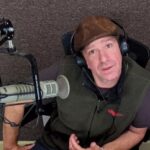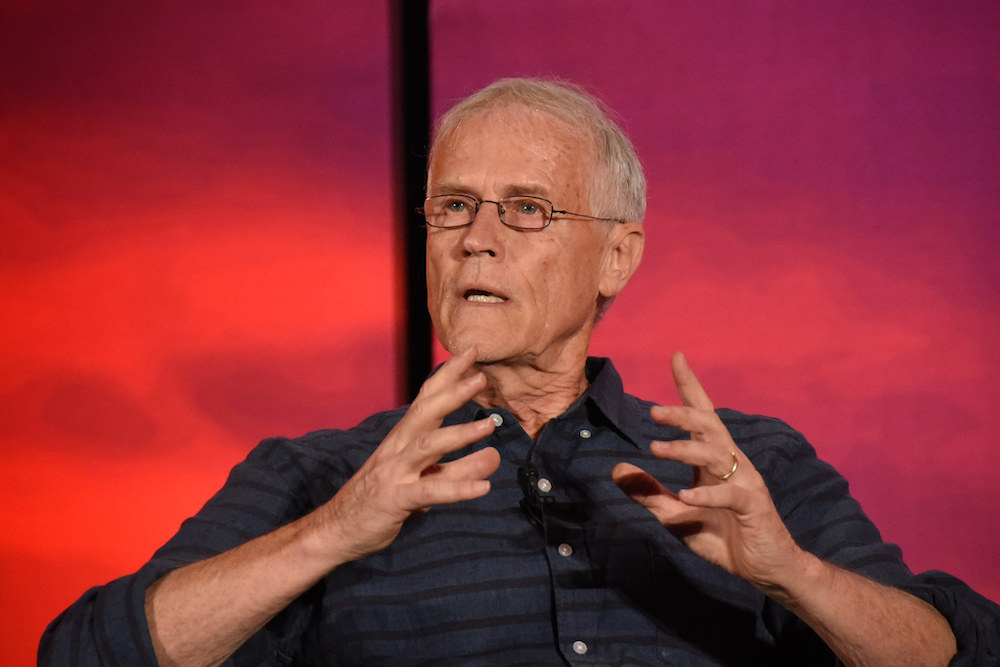
January 24, 2023 – Paul Hawken is playing hard to get.
When I email him about an interview ahead of EcoFarm 2023, he replies, “If you ask me what I am going to say, my answer would be don’t know and if I could say it in a sentence or two, I would not need to give a talk. :-)”
“Valid point!” I replied. “I like your style.”
His style, for the uninitiated, can be called visionary, optimistic, exuberant and planet-saving, which sounds like overstatement.
It’s not.
He recently wrote Regeneration: Ending the Climate Crisis in One Generation, which maps out in vivid detail the immediate promise of inclusion, bioregions, azolla ferns, food localization, fire ecology, decommodification, forests as farms, and “the number one solution for the world: electrifying everything.”
He did grant the interview, and only treaded ever so lightly on his speech, which I’ve now watched more than once.
In that speech he doesn’t blow your mind. Instead he sets off a minefield of radiating explosions that will re-erupt every time you stop and appreciate a plant. With durable enough audio equipment, he could’ve dropped the mic a dozen times, but that’s definitely not his style.
Galvanizing nuggets from the speech—which describe everything from how plants indisputably rule the world (*explosion*) to the ways mycelia communicate in sentences (*repeat explosion*)—appear here. Highlights from our conversation beforehand and the pre-conference follow.
Meanwhile the full speech is live under “Real Organic Project | Soil-Grown, Pasture-Raised Food,” whose YouTube channel merits a subscription.
The intro to Hawken’s speech starts at timestamp 18:15 and runs under a half hour. The wider series of talks is also available at the same link with timestamps next to each speakers’ name.
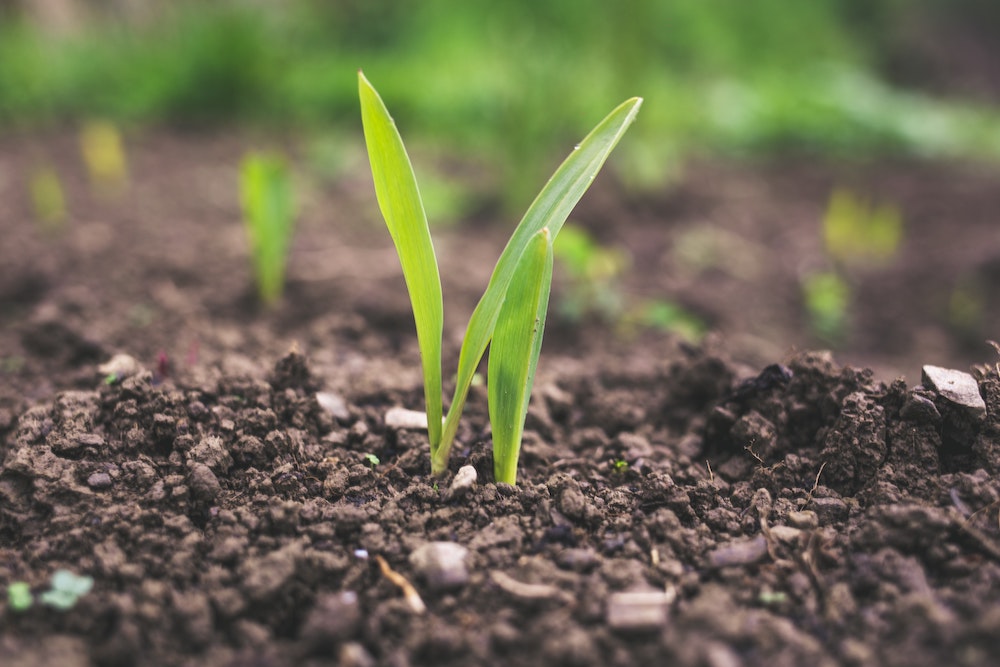
“What this planet has given us, all of us—this indescribably beautiful planet—is everything,” organic grower Hugh Kent said at one point on stage. “Let’s not squander it.”
“Isn’t it amazing how long a minute is?”
Before he began in earnest, Hawken called for “a moment of silence, a moment of gratitude ” to pause and reflect at “how beautiful and extraordinary it is to live upon and within the world we’re born into.” When the moment stretched to a minute, I couldn’t help but wonder how short the human moment on Earth will be if more people don’t heed Hawken’s words.
“Scientists are becoming shamans and shamans are becoming scientists.”
Hawken borrowed this thought from Bioneers Conference co-founder Kenny Ausubel. He used it to shed light on what comparisons between Western science (“objectified,” in his parlance) and indigenous (or “observable”) can bring. Indigenous takes the observable fact that nature never repeats itself, he added, no two oak leaves are the same. “In Western science, if you can’t repeat something it’s not true.”
“We don’t have a clue what’s going on down there.”
When it comes to soil (and, yes, life), the more we discover, the more we realize how little we know. “In a sense this conference is about soil,” he said, adding later, “The largest and most complex form of life is underfoot, underneath us, under the ground. There is more life [and] biomass under the ground than above the ground.”
“Vegetables are not vegetarians.”
Hawken paraphrased regenerative ag expert John Kempf with this. Mycelia filament can make loops to squeeze nematodes to death and then consume them. The point: Plants do amazing things, including transact with mycelium by way of each of their 1 million roots.
“It’s the plant Earth. Not the human Earth.”
Ninety nine percent of the biomass on top of the Earth is plants. “Plants leave, we’re gone,” he said. “We leave, the plants take over. We know who’s in charge here, whether we like it or not.”
“No brain, no neurons, no nervous system! How does [language] happen?”
Scientists have developed electrodes to study the electrical signals mushroom networks communicate with. They’ve found 50 words—signals that repeat themselves—so far, and whole sentences more complex than Indo-European languages.
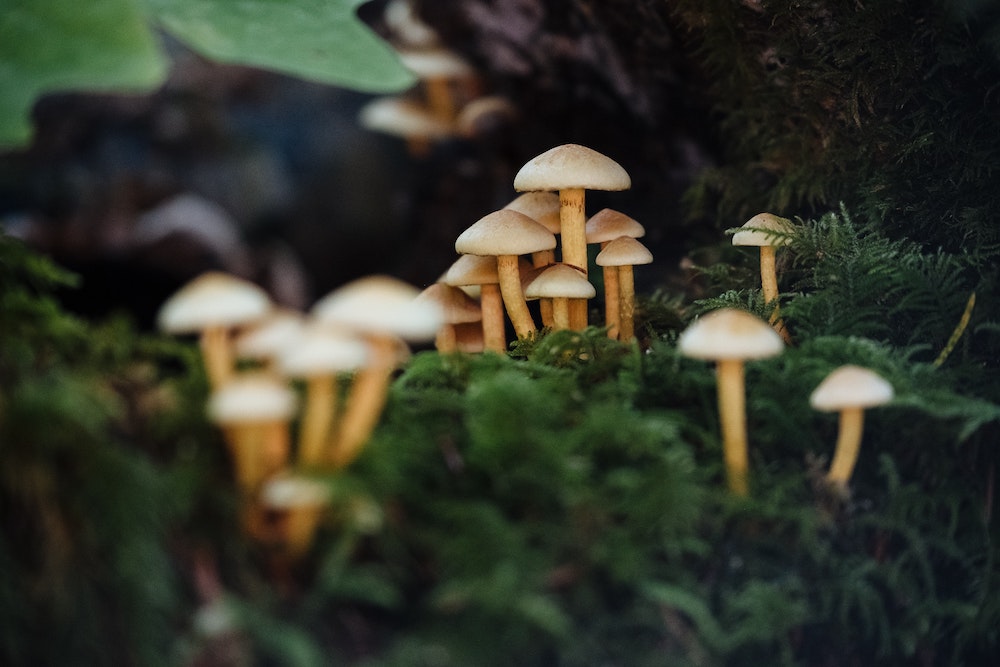
When we spoke, Hawken described the “astonishing moment of truth” we have on our hands.
“The climate crisis is not a science problem; it is a human problem,” he said. “The ultimate power to change the world does not reside in technologies. It relies on reverence, respect, and compassion—for ourselves, for all people, for all life.”
He also seeks to reframe regeneration. “Regeneration is oftentimes seen as applied to soil and farming,” he said. “It applies to everything…It’s a lens, it’s a principle to understand what we do. Is this really what we want to do? What you produce, how you farm, how you do it—do we still want to go on that route?”
As he said in his talk, “it’s binary. Are you creating more life or less? If you’re creating less, [that’s] degenerative.”
An additional note there: Degeneration and extraction—the way of so-called conventional farming—are synonymous.
On stage he went on to detail the astounding life a handful of healthy soil contains: 5,000 insects, 100,000 protozoa, 10,00 nematodes, 500 meters of places, 100 million bacteria, and 100 kilometers of fungal filaments from 1,000 different species of fungi.
He implored the audience “to never to forget what we’re about: This relationship between human systems, plant living systems, and the systems living under the soil itself, which are actually inextricable.
“There can be no more noble undertaking right now than that. It is the most important thing.”
In the wake of Regeneration, his efforts will take three avenues: Nexus, Waggle and education.
“We’re just beginning,” he says.
Nexus will gather the most complete list of solutions—and challenges surrounding regeneration— ever assembled.
“It’s about agency, and what you can do on all levels of agency—as an individual, family, neighborhood, county, town, or corporation,” he says. The fact is where we have the most impact is where we have community.”
Waggle is a zine-like newsletter named for the dance that scout bees do when they’ve found a source of honey.
Scores of partners will all help scout the way, connecting a web of largely nonprofit organizations worldwide, whether funders, students or Belgian women advocating for forests, to use a Hawken example.
The education piece will center itself at UC Irvine with an interdisciplinary Regeneration Institute. Hawken believes that’s especially important with a vast majority of undergrads “freaked out” about the world they’re graduating into.
“And they’re right,” he says. “They get education on what’s going wrong, but not education on possibility. Regeneration is about possibility—it doesn’t whistle past the graveyard of climate crisis, because every problem is a solution in disguise.”
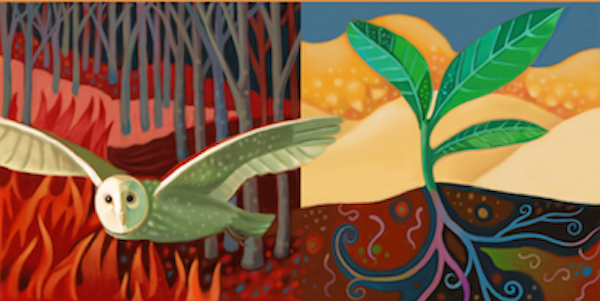
“Briny flavors, high-end Jell-O shots, a fascination with outer space and a concern for Earth.” That’s how a December N.Y. Times headline predicted eater priorities would go in 2023.
Full Belly Farms co-founder and longtime EcoFarm board member Dru Rivers was not feeling that.
Or the fact that “organic” didn’t appear once, despite the declared concern for Pacha Mama.
“Organic is truly my life, my spirituality, my every breath,” she said on stage last week. “I live the word organic every single day—and organic is much more than just a word, and certainly more than a word defined by the USDA…it’s food grown for love and compassion for others.”
She proceeded to ask, “Why are we all gathered in this room still?”
Her answer: There’s so much left to be done.
Rivers laid out an updated organic activist manifesto, with apologies to Michael Pollan, whose own goes like this: “Eat food. Mostly plants. Not too much.”
To that she added: “Start at home. Be kind. Never waver.”
On the first front (“Start at home”), she revisted her early activist years nearly a half century back, when organic was characterized as “voodoo agriculture,” the EcoFarm flyer used roll-on letters because their typewriters didn’t have multiple fonts, and friends dinners and landlines spread the homegrown movement.
“I was most inspired by people around me who led the way with their behavior,” she says.
Now that’s the approach at Full Belly, where an ambitious slate of programming and tours welcomes tens of thousands of people.
“Your farm and your business is an open invitation,” she says. “Always be open, always tell your story.”
Speaking to “Be kind,” she cited farmer-poet Wendell Barry’s It All Turns on Affection collection of essay.
“Against fear, anger, violence, criticism,” Rivers says, “love will always win. Kind words will always win over anger. All of us have been patient and kind. That’s the reason we’re still here.”
To part three, “Never waver”: “We are right,” she says. “We are on the right path without being righteous.”
Her impassioned speech got at something I asked Hawken about: What’s the point of preaching to the choir? Essentially, is it all that functional to riff on soil health to those who subscribe to it most?
Spoiler alert: He had an answer for that.
“It’s important [for organic farmers] to see their kin,” he says. “We need to see each other in places—even if it’s speaking to the converted—because we must go back into the world and do the work.”
Before that dispersal, there would be workshops and keynotes and a closing hoedown featuring SamBaDá.
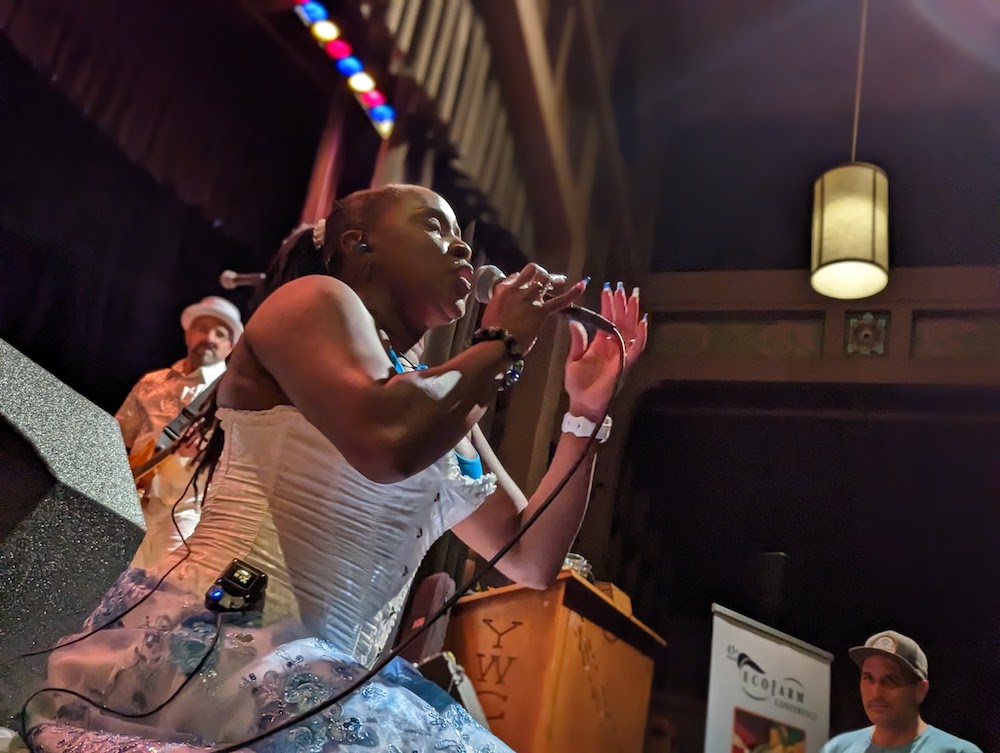
More diversity—of background and age, dancing ability and amount of Fs given—took the dance floor and moved individually and as a group.
This wasn’t no-till science or beneficial oils at work. This was survivors and strivers, young and old, thinkers and doers, gathering around a song, heard and seen.
It felt like the song was going out to the Earth, eaters and one another. Maybe you know it. “Could you be, could you be, could you be loved?”
Which is another big part of the point.
About the author
Mark C. Anderson, Edible Monterey Bay's managing editor, appears on "Friday Found Treasures" via KRML 94.7 every week, a little after 12pm noon. Reach him via mark@ediblemontereybay.com.
- Mark C. Andersonhttps://www.ediblemontereybay.com/author/markcanderson/
- Mark C. Andersonhttps://www.ediblemontereybay.com/author/markcanderson/
- Mark C. Andersonhttps://www.ediblemontereybay.com/author/markcanderson/
- Mark C. Andersonhttps://www.ediblemontereybay.com/author/markcanderson/


